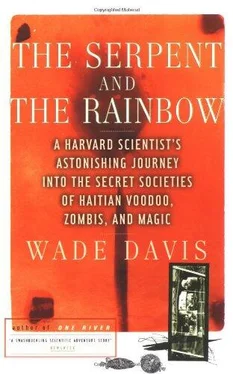Wade Davis - The Serpent and the Rainbow
Здесь есть возможность читать онлайн «Wade Davis - The Serpent and the Rainbow» весь текст электронной книги совершенно бесплатно (целиком полную версию без сокращений). В некоторых случаях можно слушать аудио, скачать через торрент в формате fb2 и присутствует краткое содержание. Год выпуска: 1985, Издательство: Simon & Schuster, Жанр: Старинная литература, на английском языке. Описание произведения, (предисловие) а так же отзывы посетителей доступны на портале библиотеки ЛибКат.
- Название:The Serpent and the Rainbow
- Автор:
- Издательство:Simon & Schuster
- Жанр:
- Год:1985
- ISBN:нет данных
- Рейтинг книги:5 / 5. Голосов: 1
-
Избранное:Добавить в избранное
- Отзывы:
-
Ваша оценка:
- 100
- 1
- 2
- 3
- 4
- 5
The Serpent and the Rainbow: краткое содержание, описание и аннотация
Предлагаем к чтению аннотацию, описание, краткое содержание или предисловие (зависит от того, что написал сам автор книги «The Serpent and the Rainbow»). Если вы не нашли необходимую информацию о книге — напишите в комментариях, мы постараемся отыскать её.
The Serpent and the Rainbow — читать онлайн бесплатно полную книгу (весь текст) целиком
Ниже представлен текст книги, разбитый по страницам. Система сохранения места последней прочитанной страницы, позволяет с удобством читать онлайн бесплатно книгу «The Serpent and the Rainbow», без необходимости каждый раз заново искать на чём Вы остановились. Поставьте закладку, и сможете в любой момент перейти на страницу, на которой закончили чтение.
Интервал:
Закладка:
Herard Simon directed us into the outer chamber of his hounfour. The negotiations were layered with go-betweens, but with no introductions. Herard spoke first, with a few measured words that seemed to secure each person to his will, establishing himself as the principal broker, and then said little. The military official hovered somewhat paternalistically over the peasants, but they spoke for themselves, in a heavily accented Creole that betrayed their roots deep in the mountains. They had a zombi, they claimed, and they also offered to prepare a sample of the poison. The discussion flared with proposal and counterproposal, while their hairless leader tossed off figures in great flurries of bravado, as if the mere mention of such astronomical sums might, like a charm, make them come true. His two partners clearly enjoyed the whole business; they rose up and down on their haunches, urging him on. When I sliced the price, they reacted with pious indignation.
Throughout all this Herard Simon sat silently near the wall, leaning forward on a wooden chair, resting his weight on his knees, virtually immobile. A menthol cigarette burned in his motionless right hand. His very indifference kept command of the conversation. Finally, perhaps tiring of the inconclusive banter, he lifted both his arms and turned to the soldier.
“Where is it?” he asked.
“They have it with them.”
“Then bring it forward. Perhaps a zombi will loosen the blanc’s purse.”
The one in uniform said something to the leader of the peasants. He started to argue, but stopped and, reaching into a dusty bag, pulled out a small ceramic jar wrapped in a red satin cloth. Herard started to laugh, but his laughter had the edge of anger.
“Fools!” he cried. “Not that . They want the flesh.”
The significance of his words was lost for the moment in the blur of his rage. Scattering invectives, he banished all of us from the hounfour. The peasants fled, the officials foundered, and with total contempt Herard made his way back across the courtyard to his house.
He was laughing more jovially by the time we caught up with him. “Imagine, blanc,” he said to me, “they brought you a zombi astral because they didn’t think you’d be able to get a zombi of the flesh through immigration!”
“Wait a minute …” I started to say.
The expression on Herard’s face told me he was surrounded by idiots and I was one of them. “Three days,” he answered, “return in three days.” Again I started to say something, but his thick fingers passed once before his face to cut me off.
Two types of zombis, I thought. That changed everything.
In the summer in Haiti the spirits walk, and the people go with them. For weeks in July the roads come alive with pilgrims, and we followed them.
Leaving Gonaives, Rachel and I drove north across the mountains to the lush coastal plain, calling first at the sacred spring and mudbaths of Saint Jacques, and then moving on to the village of Limonade and the festival of Saint Anne. Here they had gathered, literally thousands of them dressed in the bright clothes and colors of the spirits, fused in hallucinatory waves that flowed across the plaza.
The seething edge of the throng enveloped us even as we stepped from the jeep. We were carried, flesh to flesh, by the collective whim of the crowd. It was like being pushed through the stuffed belly of a beast, and soon we were ploughing through the throng to the nearest refuge, the stone steps of the church standing firm like a jetty above the madness.
Our senses numbed, we entered the church and were well inside the nave before we realized what was going on. It was the Mass of the Invalids, and at our feet lay the most diseased and wretched human display imaginable. Lepers without faces, victims of elephantiasis with limbs the size of tree trunks; dozens and dozens of dying people, collected from the length and breadth of the country to seek alms and redemption at the altar of this church. It was a scene of such singular horror, we could think only of escape.
Rachel stepped ahead of me toward an open door, and then gasped. There in the shadow of a cross, her head covered by a black shawl, was a single woman, and draped across her legs was her daughter, a teenage girl whose shattered legs crossed like sticks. Her skin was jet black and her head a grotesque melon, so swollen with disease that you could see the individual follicles of hair. It was a sight so terrible that we could not pass. We turned back to wade through the brown-frocked beggars carpeting the front of the church, and as we passed they tugged at our clothes. There was nothing for them, and the real horror of the moment was less their condition than our fear.
Then, on the steps of the church, the scene turned into an epiphany. A healthy peasant woman, dressed in the bright-blue-and-red solid block colors of Ogoun, the spirit of fire and war, swirled through the beggars possessed by her spirit. Over her shoulder was slung a brilliant red bag filled with dry kernels of golden corn. She twirled and pranced in divine grace, and with one arm stretching out like the neck of a swan she placed a small pile of corn into each of the begging bowls. When she was finished, her bag empty, she spun around to the delight of all and with a great cry flung herself from the steps of the church. Rachel and I watched her flow into the crowd. Wherever she went the people backed away, that Ogoun might have space to spin. Our eyes followed her until she was gone, and then without speaking we dropped back into the crowd.
Our travels during the rest of that awesome day took us back across the plain to the old colonial capital of Cap Haitien, a gentle place whose warm texture belies a bloody history. At a house built on a ruin with material taken from the sea, we rang the bell of Richard Salisbury, known throughout Haiti as the British consul.
Salisbury, from what I had been told, had an enthusiastic interest in vodoun, and we hoped that he might provide some information concerning the time Narcisse had spent in Cap Haitien immediately following his release. At first there was no response, but after a second ring, the shutters of a second-floor window flung open, and the hot afternoon sun fell harshly on the etiolated body of a middle-aged man. He had just woken up.
Salisbury received us on his veranda in the shadow of an enormous Union Jack. With his handlebar moustache, peppermint complexion, and extended belly wrapped carelessly in a silk smoking jacket, he was a character straight out of Somerset Maugham. As it turned out, his knowledge of vodoun was superficial, and in fact he had nothing to do with the British government. An accountant whose meager investments in a local sugar mill had, until recently, allowed him to live royally in Haiti, he was less a diplomat than a metaphor for the demise of the empire. Salisbury now faced a major personal crisis, and we, unfortunately, were in a position to hear all about it. Corrupt partners and a depressed international market had bankrupted the mill, and he had no choice but to return to England. There he would face the life of any other middle-class accountant, riding the subway to a repetitive, meaningless job. Returning was the last thing he wanted to do, and now given the opportunity he turned to Rachel and asked quite desperately for advice. The sight of this grown man, this European whose attributes were a bit of capital and the false status once afforded to the color of his skin, beseeching a young Haitian girl, walked the fine line between comedy and tragedy.
Close to dusk, we managed to extract ourselves from the problems of Richard Salisbury and made for a coastal beach just east of the city. There beneath the palms, with the sun turning copper, we finally rested. The day had started off in the house of Herard Simon in a confrontation with the poison makers, had led to the mudbaths of Saint Jacques and the horror of Saint Anne, and then to the anachronistic Richard Salisbury. Now it ended on a pristine, tranquil Caribbean beach. I looked past the trees and heard the shrill, incoherent cry of the gulls as they swept and snapped in the waves. Down the shore there was a pair of cormorants, pelicans too. The luxury of wild things, lush and unreasonable. And in the water, Rachel, swimming like a dolphin.
Читать дальшеИнтервал:
Закладка:
Похожие книги на «The Serpent and the Rainbow»
Представляем Вашему вниманию похожие книги на «The Serpent and the Rainbow» списком для выбора. Мы отобрали схожую по названию и смыслу литературу в надежде предоставить читателям больше вариантов отыскать новые, интересные, ещё непрочитанные произведения.
Обсуждение, отзывы о книге «The Serpent and the Rainbow» и просто собственные мнения читателей. Оставьте ваши комментарии, напишите, что Вы думаете о произведении, его смысле или главных героях. Укажите что конкретно понравилось, а что нет, и почему Вы так считаете.












